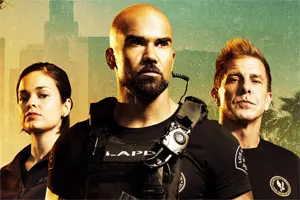S.W.A.T. tries tackling police brutality and systemic racism, but it has a long way to go
-

In the aftermath of George Floyd's killing, S.W.A.T. co-creator Aaron Rahsaan Thomas, who is Black, tweeted he was "determined to do better. Onscreen and off." The result is tonight's two-hour Season 4 premiere, which shows the team reacting to Floyd's death and the ensuing protests against systemic racism in police work. The episode even flashes back to the 1992 L.A. Riots. "S.W.A.T. can’t fix that all in one night, but unlike some of its peers, it’s better poised to try," says Hank Stuever, adding: "Co-creators Shawn Ryan (whose previous TV work includes one of FX’s earliest hits, The Shield) and Aaron Rahsaan Thomas have clearly taken aims to balance some of TV’s better narrative techniques (long story arcs, deeper characters) within the 43-minute confines of episodic network fare. Is S.W.A.T the best show around? No. Is it, however, highly engineered to satisfy specific high-energy/low-impact desires from an audience that watches TV in slack repose? Precisely yes." But Stuever notes that S.W.A.T.'s format prevents it from getting introspective about issues like police brutality. "Whatever good intentions S.W.A.T. may have had are suddenly competing with lazy stereotypes and the ever-present notion of a make-believe Los Angeles that is chronically and implausibly under assault — and utterly dependent on the SWAT unit’s brute but effective response," says Stuever. "If automatic rifles aren’t fired and buildings aren’t exploding, S.W.A.T. wouldn’t know what to do with itself," says Stuever. "It’s difficult (and even egregiously corny) to insert a 'very special episode' flavor to a show that spends so much of its time in a tactical crouch. Knowing that its viewers aren’t here for a one-hour forum on peaceful community policing, S.W.A.T. is nevertheless willing to push in this direction. As in real life, reforming systematic TV’s habits will take takes years to realize. That a show like S.W.A.T. is talking about these issues at all is a meaningful step. If they’re indeed interested in dealing with complicated emotions and long-haul storytelling, S.W.A.T. and other cop shows might do well to look at TV’s few but proud family dramas, of which there is but one reigning champion: NBC’s This Is Us, which returned two weeks ago with a powerful episode that artfully braided the pandemic and the Black Lives Matter movement into an achingly real reflection of the gamut of 2020 emotions." Meanwhile, Thomas tells TVLine of tackling issues of systemic racism in the police force: "What I can tell you is that from the storytelling end of things, we definitely buckled down and really try to make sure that we’re examining and getting as close to the truth as we can in the stories that we tell. It’s a lot of responsibility, with Hondo being our essential character — an African-American police officer who respects the job and respects the badge but also understands, having grown up in the community, what the challenges can be, and trying to bridge that gap. We’ve had it baked into the DNA of the show from the very beginning from the pilot episode."
TOPICS: S.W.A.T., CBS, Aaron Rahsaan Thomas, George Floyd, Shawn Ryan, Shemar Moore, Black Lives Matter
